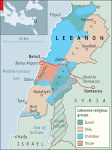
We may be in the middle of one of the most historically important months in Lebanon's recent history. Yet, as the painting on the right correctly documents, your correspondent in Beirut has been sleeping through much of it (and by the way, that's a sheet, not my pants). Apparently, I'm not the only one on vacation, as recent events here have scarcely made a mark in the foreign press.
Nevertheless:
- After twenty months of political tension, the Lebanese government has finally agreed upon a new cabinet. For further profiles of the cabinet members see Now Lebanon's report here. The Western press is framing this as a rise in power of Hezbollah, which it is, noting that they now have veto power over any decision the government makes (see the New York Time's "More Power for Hezbollah in Lebanon's New Cabinet"). The truth of the matter, however, is that the opposition holds only 11 of the cabinet's 30 seats and Hezbollah will enjoy only one of those seats. Most of the opposition's seats were taken by the Michel Aoun's Christian Free Patriotic Movement.
- Syria and Lebanon have agreed to establish full diplomatic relations with one another for the first time since the countries' independence in 1945 and 1943 respectively.
- This development came out of the first meeting of the Union for the Mediterranean, a Nicolas Sarkozy pet project aimed at bringing closer relations with the countries bordering the Mediterranean Sea (but under pressure from various EU nations, Sarkozy was forced to invite several countries whose borders are nowhere near the Sea).
- Hezbollah and Israel are scheduled to make a prisoner swap this Wednesday. Israel is said to be ready to return five Lebanese prisoners and the remains of several Hezbollah and Palestinian fighters in exchange for the remains of the two Israeli soldiers captured by Hezbollah in July 2006 (Israel used this capture to justify their 34-day war on Lebanon, which was launched just days later). There is something odd about this. You might say Israel is getting the raw end of the deal, particularly as this proves the failure and futility of their bloody 2006 war. While Israel has always taken the return of their soldiers' bodies very seriously, they are giving Lebanon more in return--five living men, including one whom Israel claims is guilty of a triple-murder. My take on this--and this is only a hunch, one I haven't seen elsewhere--is that Hezbollah has agreed to not retaliate for the assassination of Imad Mughniyeh, for which Hezbollah blames Israel, in exchange for the prisoners. A few months ago, retaliation seemed inevitable and most of us in both Lebanon and Israel feared the potential ramifications. There hasn't been a word of retaliation from Hezbollah in several weeks.
- Finally: heavy fighting between Alawite and Sunni militias (with a Salafist presence thrown in as well) has been taking place in Tripoli over the past few weeks and has killed several people and wounded dozens more. The Lebanese Army is currently asserting a heavy presence in the city in an effort to curb the fighting. For an analysis of the roots of this clashes, which are only partially related to the now dormant pro and anti government split, see Now Lebanon's interview with Hazem al-Amin.




























